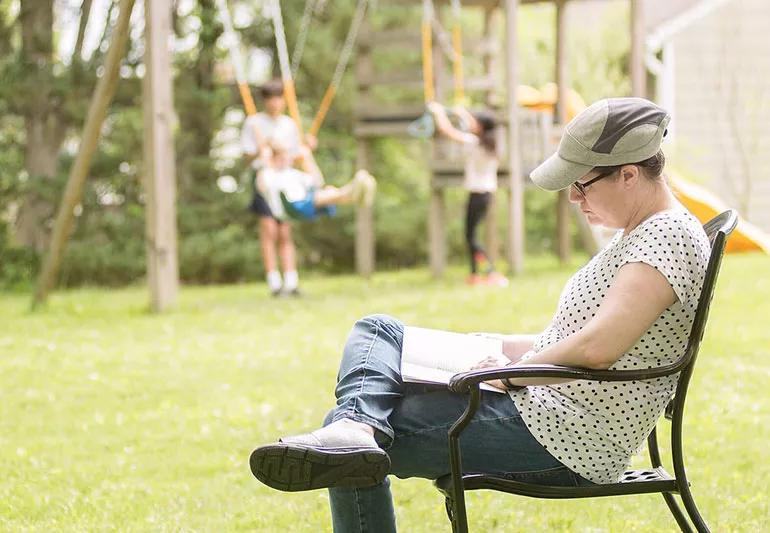Parenting tips to help you deal with too much together-time

Your children are amazing. You love them more than anything. But OMG they are driving you bananas.
Advertisement
Cleveland Clinic is a non-profit academic medical center. Advertising on our site helps support our mission. We do not endorse non-Cleveland Clinic products or services. Policy
When you’re spending extended time with your offspring, it can be hard to stay sane — especially if you’re juggling child care with other commitments, like working from home.
“Children thrive on predictability. A change in their routine — whether it’s no school during the coronavirus or just a normal summer break — is difficult on the child and the parent,” says pediatric psychologist Emily Mudd, PhD.
You might be tempted to hand over the TV remote and give up. But there’s a better way — and it doesn’t require you to be a perfect parent. “Lower your expectations,” Dr. Mudd says. “If you have that in mind, you and your child can find a new routine that works.”
Here’s eight steps to calmer parenting.
If school closures or summer break has turned your schedule upside-down, it’s time to find a new rhythm. “Try to get into a routine as quickly as possible,” Dr. Mudd says. Let kids weigh in on that schedule, she adds. “They’re more likely to stick to the plan if they have some say in creating it.”
Nope, that’s not easy when you’re on a conference call, and your kid is begging for a snack. (For the 10th time. In 20 minutes.) But if you blow your top, your kids are equally likely to erupt.
Count to 10 and take some deep breaths before you respond. It’s also OK to put off a conversation until you’re feeling more in control. “Children are looking to you to model behavior,” Dr. Mudd says. “If you’re stressed and anxious, your child will be, too.”
Advertisement
Unlimited TV and tablet time isn’t the goal. But you can use screen time to your advantage.
To minimize battles, put it on the daily schedule. When kids expect an hour of TV time from 2:00-3:00 or game time on the tablet for 30 minutes after dinner, they’ll be less likely to beg for it the rest of the day, Dr. Mudd says. And you’ll know you have those uninterrupted minutes to get stuff done.
Whether it’s upheavals from the coronavirus or tensions running high after a too-long vacation, talking it out can help, Dr. Mudd says. “Talk about the emotions you’re both feeling, and how you can work together to focus on the good things.”
When kids are really bugging you (or annoying their siblings), pause to consider what might be causing the behavior. Are they bored? Help them find something fun to do.
Are they feeling sad or worried? Kids who are stressed are often irritable, Dr. Mudd points out. “Try to figure out what’s causing the behavior, and then you can figure out how to address it.”
Learning to entertain yourself is a skill that takes time. You can’t expect a 3-year-old to hang out in her room for an hour. But you can help little ones practice independent play by giving them new objects or open-ended toys to explore on their own.
Even pots and pans will do the trick, Dr. Mudd says. “By engaging with something new, they’ll learn how play independently — and that might even give you a few minutes to yourself.”
If you’re social distancing or live far from helpful friends and family members, take advantage of technology to give you a break. Grandparents or aunts and uncles can read a book or tell a story via video chat, Dr. Mudd suggests. And while they chat, you can disengage for a second.
“Self-care is a hot topic, but a lot of the popular ideas don’t work for everyone,” Dr. Mudd says. You don’t have to do yoga or soak in a bubble bath if those things don’t speak to you.
“Figure out what taking care of yourself means for you. Is it more sleep? Having some time at night to read in bed? Uninterrupted showers?” she asks. Find some things that fill you up, then find ways to make them happen.
Will these tips magically turn your kids into cooperative angels? Unlikely. But they can help you reclaim some moments of peace. And that’s a parenting win.
Advertisement
Learn more about our editorial process.
Advertisement

The best parenting style balances enforcing rules and showing plenty of love

If parents can’t get along with one another, they’ll need to determine what’s best for their child in separate situations

This burnout is characterized by physical and mental exhaustion and feelings like worry, guilt and overwhelm

It’s important to share the news in an honest and age-appropriate way and to open the lines of communication going forward

Don’t lose sleep over color palettes — your ‘sad beige baby’ couldn’t care less

Communicating with your family, setting expectations and finding healthy distractions can make life easier once your kiddo flies the coop

Setting specific expectations and praising good behavior are crucial to cultivating discipline

Posting intimate details of your child’s life on social media, like their birth date and school name, can have serious consequences

Wearing a scarf, adjusting your outdoor activities and following your asthma treatment plan can help limit breathing problems

Your diet in the weeks, days and hours ahead of your race can power you to the finish line

When someone guilt trips you, they’re using emotionally manipulative behavior to try to get you to act a certain way